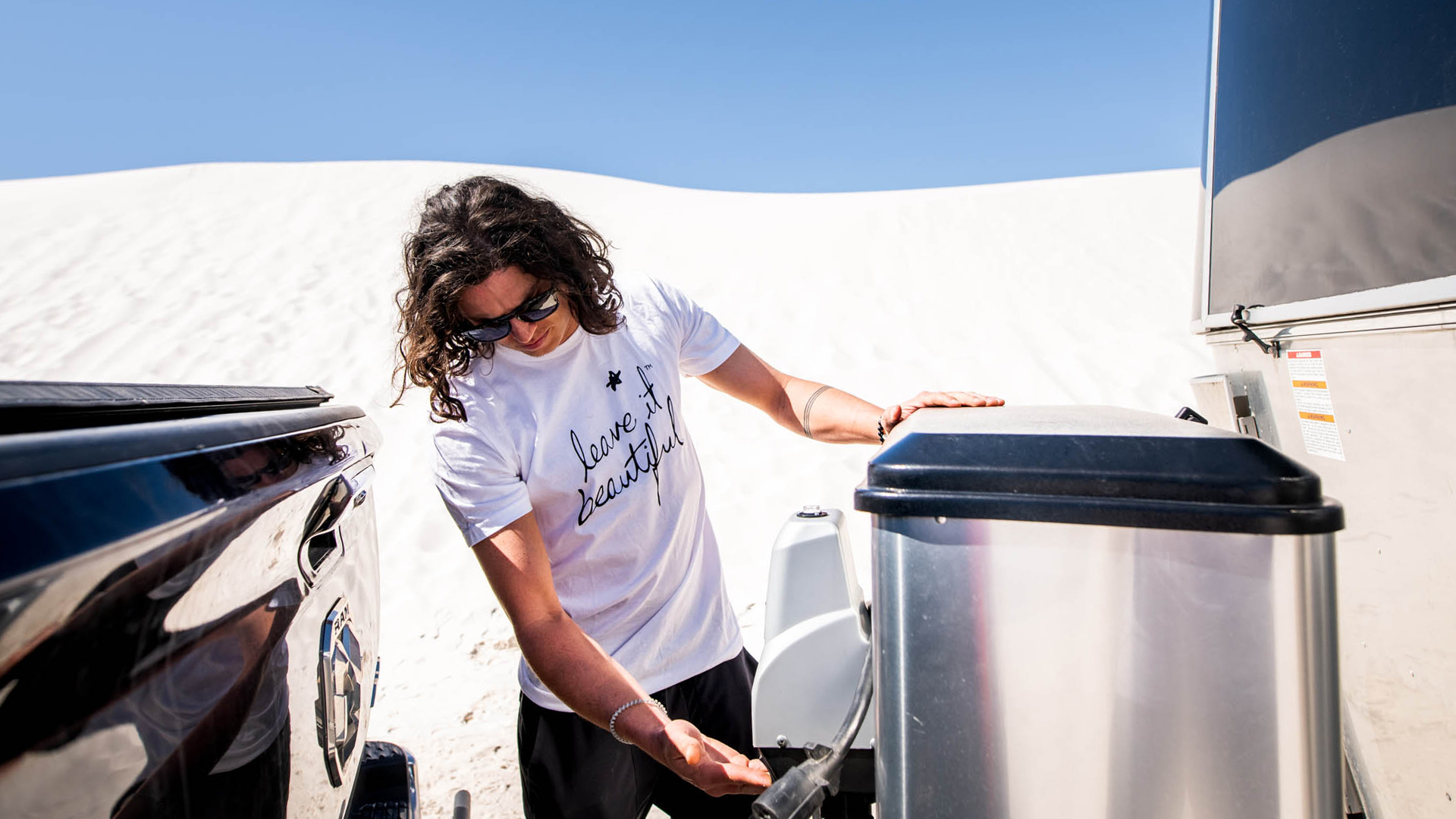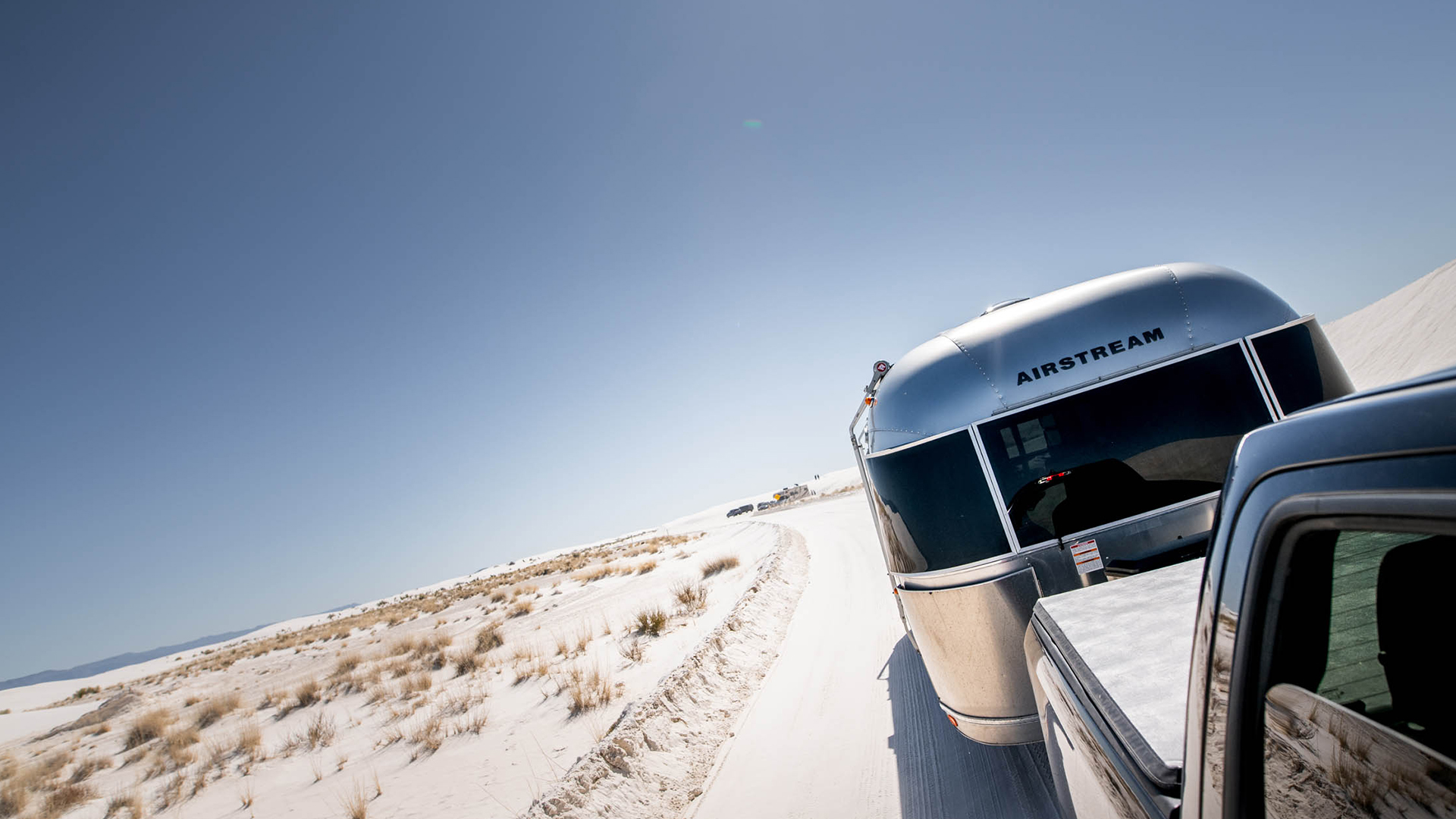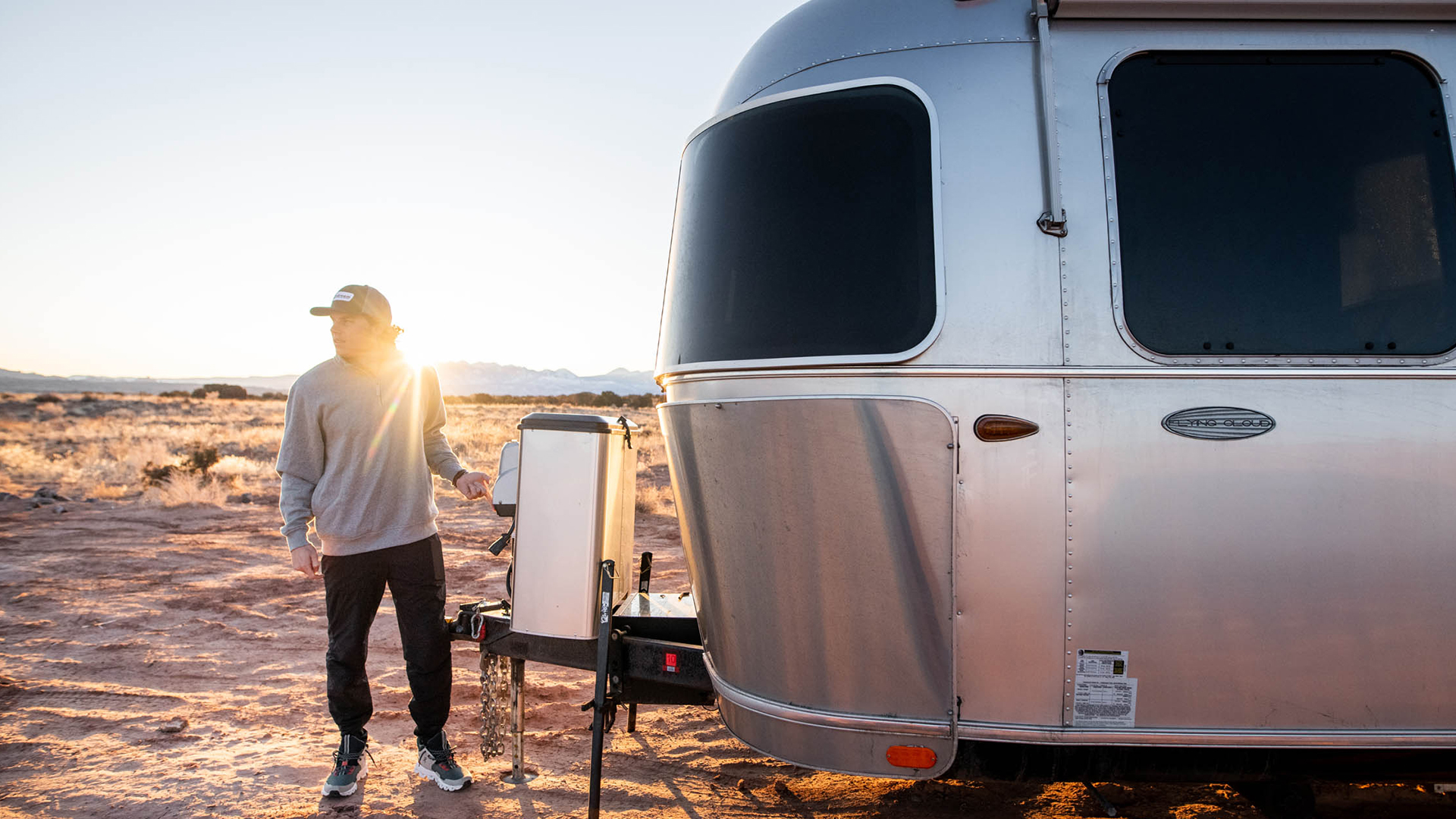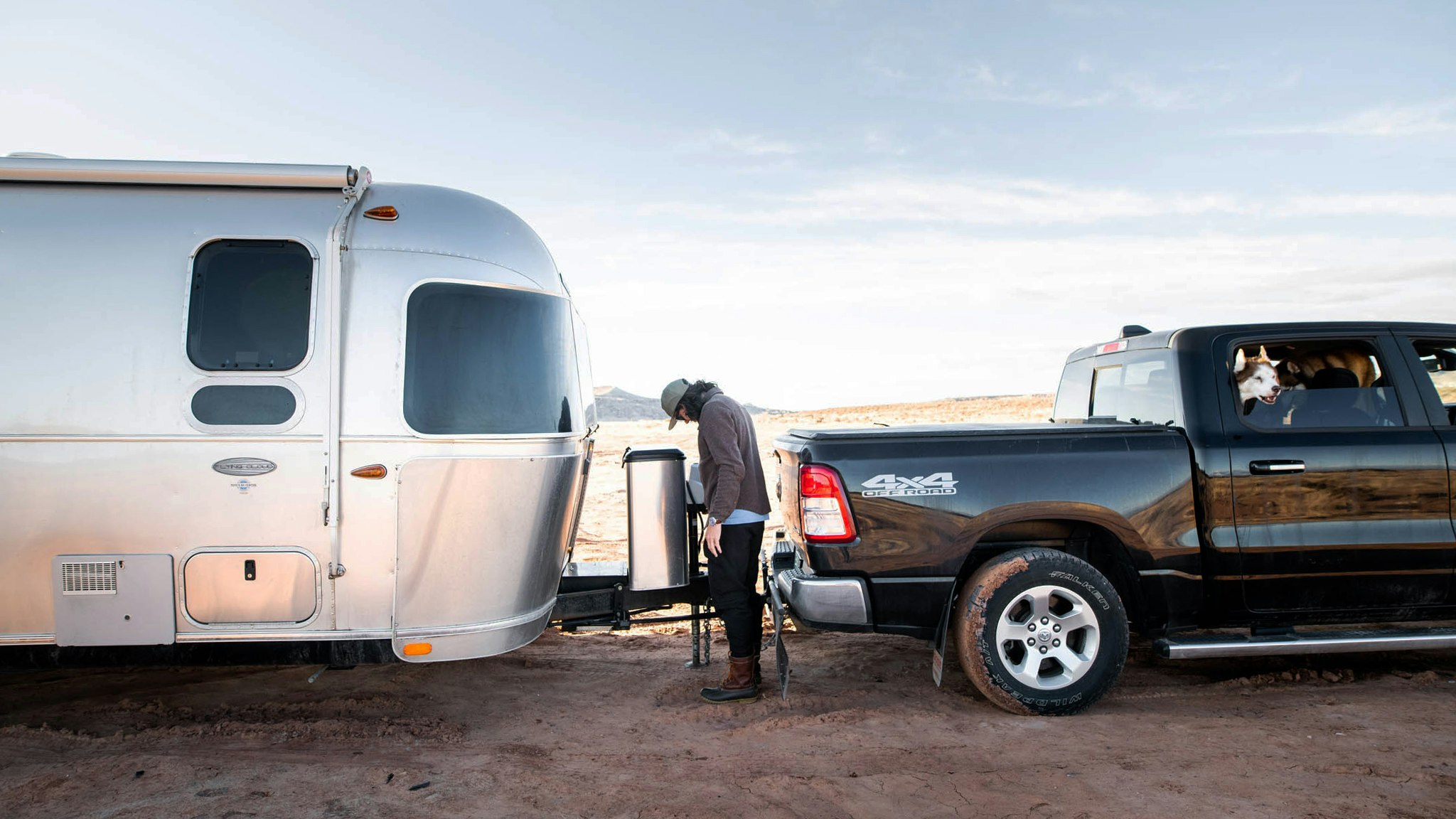Whether dry camping in deep wilderness or enjoying full hook-ups at a campground, safety is key to a great experience.
This is especially true when towing and loading. Having the right tow vehicle (and knowing the load limits of your touring coach) is critical to a safe and comfortable driving experience.

So, how do you choose wisely when it comes to selecting a vehicle to tow your Airstream? While numbers like Gross Vehicle Weight Rating and Hitch Weight play a vital role in determining a tow vehicle’s suitability, those stats simply narrow your choices. To make your best selection from those options, you need to ask yourself some important questions.
Here are some questions to ask when selecting the best tow car/van/truck for your Airstream travel trailer.
How many people typically come along?
This will help determine both how many seats you need in your tow vehicle and how much storage space you require, especially for longer outings. A family of five, for example, will be much happier in an SUV than a pick-up truck, especially if there’s a dog in the mix. A solo adventurer or couple with a lighter Airstream might be comfortable in a tow-capable hybrid.
What do we usually take with us?
How much room do you need for items like outdoor sports equipment (skis, bikes, climbing gear, SUPs)? What about kid stuff (the pack-and-play, toys and trikes)? Do you routinely bring along a generator, gas grill, or firewood? Consider both the volume and nature of your kit when determining if your tow vehicle has the capacity to haul your gear and personal belongings.
Where do we spend our outdoor time?
Be sure that your tow vehicle can handle your preferred environments. If you love to answer the mountains’ call, a tow package is important. You may even want to consider diesel vehicles, which often do well pulling heavy loads up steep climbs. If boondocking is your thing, four-wheel drive might come in handy. A standard SUV or hybrid that can easily navigate urban streets could be perfect for Airstreamers with lighter models who frequently visit cities, towns, and tourist attractions.
What other purposes will this vehicle serve?
Rarely is a car, truck, or van dedicated solely to towing. Think carefully about additional roles you might need it to play so you don’t ask too much of one vehicle. For example, will your tow vehicle double as your everyday drive? If so, you need to consider the demands of both tasks and look for something that comes closest to fulfilling both purposes. If you have a long commute, you may not be satisfied with the gas mileage you get from a truck capable of comfortably towing your Airstream. Do you want to carry kids or business associates in a van or SUV that’s habitually full of wood chips or smells like gasoline because you haul a generator in the way-back a couple of weekends a month?
For more insight on all these questions and issues, talk to your nearest Airstream dealer. They have almost certainly tapped their experience and knowledge to help a customer with similar needs find the right tow vehicle.

Back to the Numbers and Acronyms
Once you’ve settled on the best type of vehicle – hybrid, van, truck – for your needs, it is essential to understand and heed the following weight considerations and limits. As you assess your choices, remember that excess towing capacity is better than barely enough. Your Airstream dealer and vehicle dealership can address all the nuances of these numbers for the Airstream units and tow vehicles you are considering. The car guys can fill you in on how various configurations – tow package, diesel engine, four wheel drive – will impact both your towing capacity and overall driving experience.
Gross Vehicle Weight Rating (GVWR) - This is the maximum allowable loaded weight of your tow vehicle or Airstream, as set by the manufacturer. GVWR includes the weight of passengers, cargo, and the vehicle itself. Exceeding the GVWR poses significant risks as it makes the vehicle difficult to control, slow, or stop.
Tow Rating - The vehicle manufacturer’s rating of the maximum weight that can safely be towed by a vehicle. Your RV’s GVWR should not exceed your Tow Vehicle’s Tow Rating.
Net Carrying Capacity (NCC) - The total weight that your Airstream can carry, including cargo and passengers. NCC does not include the weight of the unit itself. Never overload your Airstream. That excess weight can create a dangerous amount of inertia, making it difficult to stop. And, over time, those added pounds will take a toll on your tow vehicle’s brakes, suspension, frame, and engine.
Unit Base Weight (UBW) - Sometimes called “dry weight,” this is how much your Airstream weighed when it rolled off the assembly line – before you started putting stuff in it.
Hitch Weight (HW) - Also known as Tongue Weight, this is the amount of weight a trailer's tongue places on the tow vehicle’s hitch. Because the hitch is attached to the tow vehicle’s frame, exceeding your tow vehicle’s tongue weight rating will push down the rear of the tow vehicle, causing not enough weight to be on the front axle. The result is difficulty steering, possible loss of traction, and trouble stopping. Hitch Weight can be influenced by the distribution of weight inside your Airstream. If you are bumping against your tow vehicle’s Hitch Weight limit, consider a distribution hitch, which can help level out your Airstream and tow vehicle. The Airstream hitch weight includes the batteries and propane tank weight.
Occupant and Cargo Carrying Capacity (OCCC) - This standard is applied to motorized RVs. The Occupant and Cargo Carrying Capacity is the maximum allowable weight for everything onboard the unit – people, pets, food, tools, full water, and LP tanks plus personal belongings.

Use the following table as a guide when exploring different Airstream Travel Trailers and potential compatibility with different tow vehicles.









